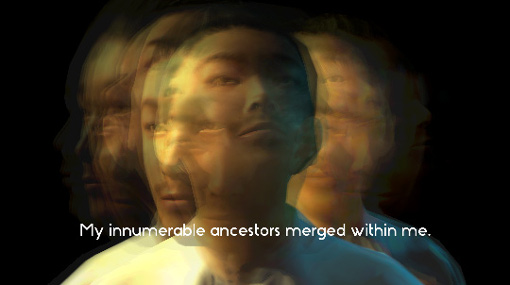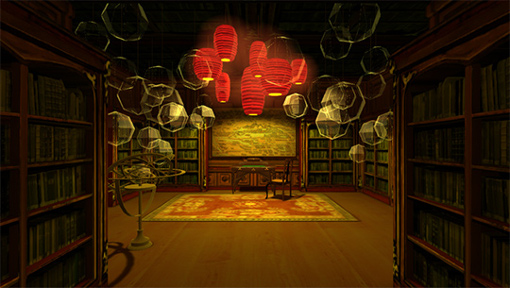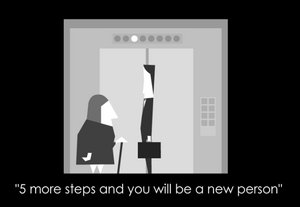From a 4 January 2010 conversation between Mary Flanagan and Nick Montfort:
nick: so, I just have this question about the way you (and someone else) reacted to gender stereotyping in a nightmarish/dystopian/stereotypical game environments
nick: you wrote While there are some glaring stereotypes that take away from its freshness and originality (especially in regard to gender; the character’s wife is in the kitchen with a frying pan in the morning and tells the character he is late for work; the office execs are all male, etc.) about Every Day the Same Dream [previously on Post Position]
nick: it struck me because I was describing a student project to a poet
mary: y
nick: one which was completed before that game launched
nick: but had a similar stereotyped/nightmare world made of words in 3D space
nick: one of which was “wife”
nick: and my poet friend said “spouse”!
mary: ok….
nick: but I don’t understand why these negative-valence spaces that embody stereotypes in all these other ways
nick: are supposed to be equitable when it comes to gender
mary: well…
mary: I am not partial to other stereotypes either
mary: unless they are spoofed in incredibly interesting ways
mary: but
nick: I read Every Day the Same Dream as having entirely white people, too
mary: for example if I brought them all up all the time, I’m a horrible harpy broken record, and that isn’t my point in life. But not bringing things up = acceptance
mary: yes exactly
mary: I agree and I had that in there and then cut it out.
mary: for reason above.
nick: well, I guess I would point those things out as being consonant with the project rather than as taking away from it
nick: the game (and my student’s project) seems to be saying “here is an even more exaggerated version of the stereotypical world”
mary: well that could be. But everdayness, monotony, boredom could be happening to two people following that routine, two men, women, or one of each if we’d like. Or three for that matter. It just the frying pan and housewife just needs to go.
nick: well, they do, eventually &smiley;
mary: Since there are more women than men, why could not the character be a woman going to a drudge job?
nick: but you’re trying to make the game an image of reality instead of nightmare hegemony
mary: you could make the office workers men and women of different races
mary: it annoys me — I have not collected the numbers, but it annoys me that existentialist moments appear to happen more with male characters. 1984. etc.
nick: then, I’d argue, the game would not become more realistic or effective; it would have this sort of parody of workplace diversity in it
mary: well I did add diversity to the LAYOFF game. Everyone started white, the artist (who was Asian) defaulted to white)
mary: well then perhaps that would speak to me as a player as an effective parody
mary: mock diversity says something else, and is interesting. especially in college ads.
nick: yes, but I see that (LAYOFF) as trying to poke a hole through the abstract, we-don’t-expect-this-to-represent-reality type of game to show something about the real world
nick: which is admirable, but it isn’t the same project as these other games
mary: I guess I am rejecting the repeated aesthetic of abstract commentaries that use a represention of all white men.
nick: I’m asking because I’ve heard the same comment twice about the same type of game, from two people whose perspectives I very much respect, but I don’t understand the problem with this particular context – with a dystopian game exhibiting sexism among other stereotypical ills
mary: ah ok
nick: so it’s not that the sexist portrayal is wrong for the context, but that you could have made a different game which made the same point without it?
nick: maybe?
mary: yep
mary: and possibly a more interesting game, through reworking or challenging these stereotypes
mary: but that remains to be seen in implementation
nick: Jason Rohrer gets complaints about Passage having only a guy avatar as an option
mary: i can see that.
nick: of course, he also has described Passage as autobiographical (although I argue with his use of that term)
mary: it’s not automagically horrific to include men in a game!
nick: sure, and it’s not automatically good in every way to include a hot chick avatar
mary: right.
mary: it is about intentionality
mary: and I don’t think molleindustria was intentionally critiquing white heterosexuality.
mary: in fact…
nick: do you think if the sexism in Every Day the Same Dream were somehow called out as such (I don’t have any ideas about how), and critiqued, it would be better?
nick: perhaps even better than making a gender-neutral version?
mary: possibly!
mary: but that isn’t the point right now.
mary: of that game.
nick: I’d say it was being critiqued about as much as the automobile was
mary: and granted, 6 days, its a miracle.
nick: yep
nick: well, it’s worthwhile to think about how to improve on a 6-day project like that, though
mary: Hm. It feels different. The automobile isn’t on the receiving end of dates who have sexist attitudes, or jobs with racial bias. Possibly certain critiques are touchier than others.
nick: I guess my feeling is that a sexist world (treated critically) would be more in keeping with the project, or with a project like that, than a gender-neutral one
nick: maybe it’s easier to critique the automobile
mary: that could be true. Then husband and wife could both go to work, but he brings home twice the salary and she still has to cook
mary: that makes it more interesting to me.
nick: ha
mary: it pays attention to a lived condition.
mary: a detail. see what i mean. could be the same for race and such. but details are hard to put into ‘dreams’ and broad strokes, unless we think about it cleverly
mary: I appreciate your inquisitveness here nick.
nick: I guess the game includes a lot of stereotypes, and from my standpoint I don’t see it buying into any of them. but some do call for more critique and treatment
nick: I appreciate the convo
mary: Bringing this stuff is actually harder than ignoring it and moving on.
mary: but I think we need to tease out these implications
mary: not all stereotypes are created equally
nick: I think we should do a blog post, actually
mary: ok i’m game.




